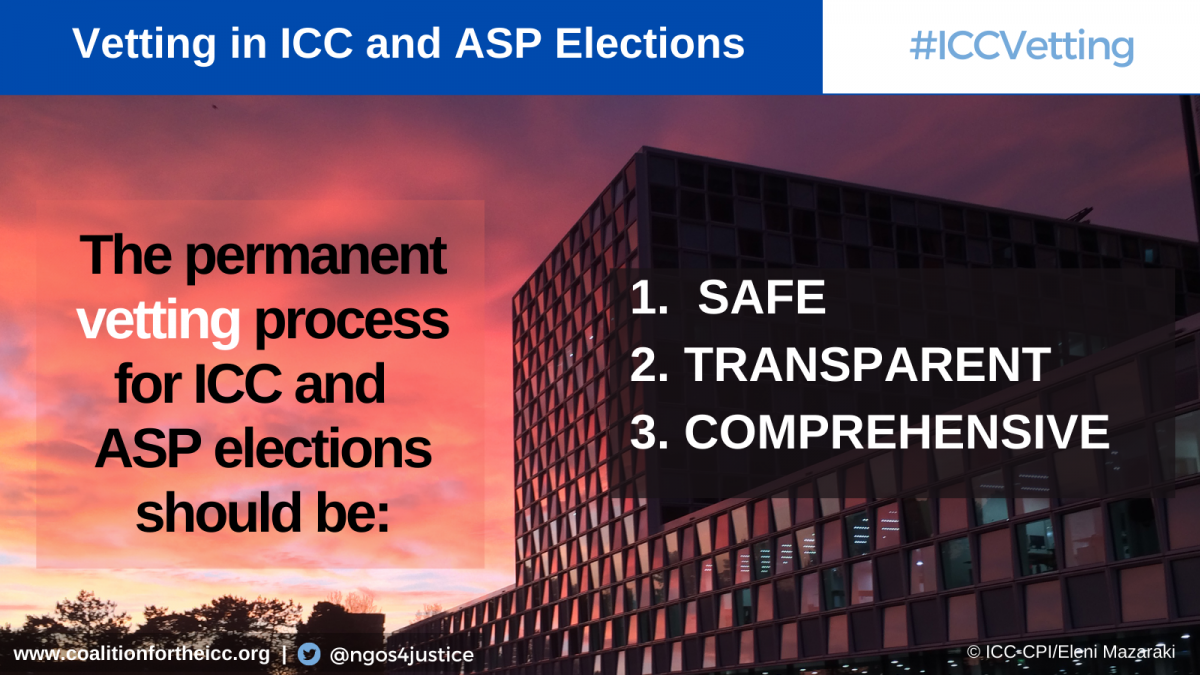
Vetting for all ICC and ASP elections
Vetting for all ICC and ASP elections
The Coalition for the ICC closely monitors the processes to elect leaders of the International Criminal Court (ICC) and its governing body, the Assembly of States Parties (ASP), and has consistently called for the election of only the highest qualified candidates through fair, transparent, and merit-based nomination and election processes.
Since 2020, the Coalition Team on Elections has advocated for the introduction of a permanent vetting process to ensure candidates possess a high moral character as required by the Rome Statute. As a result of civil society advocacy and like-minded ICC States Parties’ efforts to address the vetting gap, the ASP has committed to develop and adopt a vetting process for all elected ICC officials by December 2023. As States Parties develop the terms for the a permanent vetting process, the Coalition is calling for a process that is safe, transparent, and comprehensive so it is purpose-built and set up to successfully assess whether candidates possess a high moral character.

Where are we now?
At the 21st session of the ASP in December 2022, the Bureau of the ASP agreed to continue consultations with States Parties, the Court, and civil society for the development of a vetting process for all elected ICC officials, with a view to adoption of a vetting process as soon as feasible and no later than ASP22. On 5 April 2023, the ASP President, Silvia Fernandez de Gurmendi, drafted initial terms of reference for the ICC’s permanent vetting process, which is now being reviewed in consultations with States Parties and civil society. In June 2023, the Bureau of the ASP appointed Nicolás E. Ortiz Marín (Ecuador) and José Juan Hernández Chávez (Chile), as co-facilitators on the establishment of a due diligence process for elected officials. The co-facilitators are consulting with States Parties, non-States Parties, the Court and NGOs, and aim to submit a draft report in the fall for the consideration of States Parties. Also in June 2023, the CICC Elections Team issued a position paper, with recommendations on ways to enhance the draft terms prepared by the ASP leadership for the permanent vetting process. The initial draft provides a solid framework which we believe can be further strengthened and developed, including through additional elements and details. This will enable States Parties to adopt a process at ASP22 that is robust and purpose-built – to ultimately ensure it is set up for success and can deliver on its core objective to effectively assess candidates’ high moral character.
Read more in our recent publications:
- Blog on recent developments with CICC poll on the definition for High Moral Character
- CICC Elections Team Position Paper on the initial draft for the permanent vetting process for all ICC elections
- Comparative Analysis Chart on the three ad hoc vetting processes together with the ASP Presidency’s initial draft terms of reference for the ICC’s permanent vetting process, with comments and recommendations on further aspects of the process.
Background
In addition to the qualifications and experience necessary for each role, the Rome Statute of the ICC requires that the judges, prosecutor and deputy prosecutors, and the registrar of the Court “shall be chosen from among persons of high moral character.” The process held in 2020 for the election of the prosecutor evidenced that adequate systems to assess this statutory requirement were necessary.
After allegations of misconduct surfaced against certain prosecutor candidates in 2020, a lack of a reporting mechanism and vetting process to screen complaints resulted in rumours being circulated on social and mainstream media. The Coalition has raised awareness on the need to adopt a permanent vetting process for ICC elections.
Both the Committee on the Election of the Prosecutor (CEP) and a panel of experts recognized the shortcomings of the limited vetting conducted in the context of the prosecutor’s election. The CEP reported that:
“[f]uture selection processes – for all elected officers, not just the [p]rosecutor – should include a clear process for determining the ‘high moral character’ qualification of candidates.”
The panel of experts further recommended the development of a dedicated mechanism for receiving and assessing complaints regarding candidates in future elections of the prosecutor and deputy prosecutors. They highlighted the need for such a mechanism to ensure anonymity of complainants and include adequate whistle-blower protections, stressing that
“considering, the relatively small world of international criminal justice is a barrier for individuals reporting harassment, the confidentiality of potential victims must be an essential pillar in any process developed.”
In light of the controversies surrounding the process and the clearcut recommendations, states were prompted to develop ad hoc ‘due diligence’ processes for the deputy prosecutor election 2021 and then again in 2022 for the registrar election.
At the 20th ASP session in December 2021, ICC States Parties ultimately agreed “to adopt a permanent vetting process for all elected ICC officials by the 22nd session of the Assembly in December 2023”. The ASP also initiated a lessons learnt exercise and in October 2022, published a Lessons learnt report on the third election of the prosecutor, which confirmed that “a large majority of States Parties considered vetting to be central to the election process, and considered that there should be clear rules, covered in the Terms of Reference, from the start.”
Building on these advancements, in the lead up to the 21st session of the Assembly in December 2022, the Coalition Elections Team called on ICC States Parties to agree on the next steps for developing the permanent vetting process. See here the Coalition Elections Team Paper of November 2022, “Recommendations to States Parties in relation to the development of a Permanent Vetting Process for all ICC and ASP elections”.
In order to inform the discussions and galvanize consensus around the importance of vetting of ICC and ASP leaders in order to build a safe work environment at the Court at the 21st session of the ASP, the Coalition, together with Human Rights Watch and the Global Justice Center organized a side event, co-hosted by Austria, Colombia and Serbia, entitled “Vetting for all ICC elections - the essential elements unpacked” to discuss the next steps in the development of the process and explore the necessary essential elements of a sound vetting process. Panelists included Ambassadors Ksenija Milenković of Serbia and Alexander Marschik of Austria, facilitators of the Lessons-Learnt exercise, Priya Gopalan, International criminal lawyer and gender specialist, Géraldine Danhoui, President of the ICC Staff Union Council, Saklaine Hedaraly, Head of the ICC’s Independent Oversight Mechanism (IOM), and Ekaterina Tomashchuk, Managing Director at Mintz Group. Group.
At the 21st ASP session, the Assembly decided to continue consultations with states, the Court and civil society towards the development of a vetting process for all elected ICC officials, with a view to adopt the vetting process no later than the ASP’s 22nd session in December 2023.
